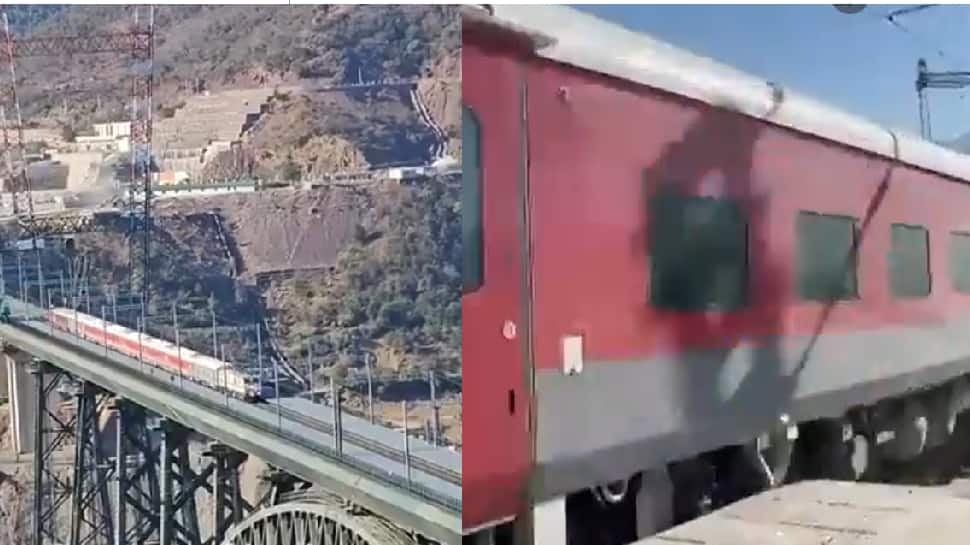 |
|
The Indian Railways has achieved a monumental feat with the successful completion of a high-speed trial run on the challenging Katra-Banihal section of the Udhampur-Srinagar-Baramulla Rail Link (USBRL) project. This significant milestone marks a turning point in India's ambitious plan to connect the remote region of Kashmir with the rest of the country via a robust and efficient railway network. The trial, conducted at an impressive speed of 110 kilometers per hour on a steep, 180-degree rising grade, showcases the remarkable engineering prowess and dedication of the teams involved. Overcoming numerous geographical and logistical hurdles, engineers meticulously planned and executed the project, demonstrating the capabilities of Indian engineering and construction. The successful navigation of Tunnel-30 (T-30) at this speed further underlines the precision and sophistication of the railway line's design and construction.
The successful trial run on the world's highest railway bridge, spanning the Chenab River, adds another layer of accomplishment to this already extraordinary achievement. The Chenab Bridge, a marvel of modern engineering, stands as a testament to the ingenuity and resilience of Indian engineers who persevered through challenging terrains and unpredictable weather conditions to realize this ambitious project. The completion of this bridge, along with the successful trial runs conducted on other segments of the USBRL project, including the Anji Khad bridge, signifies a momentous step towards fully operationalizing the rail link between Katra and Banihal. This section, upon completion, will dramatically reduce travel times and significantly improve connectivity between Kashmir and the rest of India, fostering economic growth and social development in the region.
The USBRL project, initiated in 1997, has faced numerous delays due to the complex geological, topographical, and meteorological challenges presented by the Himalayan terrain. The project's completion, however, has been steadfastly pursued, reflecting the Indian government's commitment to national integration and infrastructure development. The successful trial runs and the upcoming final stage CRS (Commissioner of Railway Safety) inspection for the Katra-Banihal section mark the final stages before the launch of regular passenger services. This is expected to usher in a new era for Kashmir's connectivity, linking it seamlessly to the broader Indian railway network. Once fully operational, passengers will be able to travel by train from Kashmir to Kanyakumari with minimal changes, a testament to the transformative potential of this railway project.
Beyond the immediate impact on travel and connectivity, the USBRL project carries significant implications for the socio-economic development of the Kashmir region. The improved accessibility will stimulate tourism, facilitate trade, and create new opportunities for employment and investment. The project’s success serves as an inspiration for future large-scale infrastructure projects in challenging terrains, highlighting the potential of strategic planning, innovative engineering solutions, and unwavering commitment to overcome obstacles. The legacy of the USBRL extends beyond the rails themselves, representing a significant contribution to India's national infrastructure and a symbol of progress and resilience in the face of adversity. The project not only showcases India's engineering capabilities on a global stage, but also embodies a commitment to integrating a previously isolated region into the nation's economic and social fabric. The completion of this project will undoubtedly strengthen national unity and facilitate socio-economic growth in Kashmir, leading to long-term benefits for the entire region and the nation.
The successful trial run is a testament to the collaborative effort of multiple stakeholders, including engineers, technicians, and government officials. It reflects years of hard work, innovative solutions, and a commitment to excellence. The meticulous planning and execution of the project stand as a shining example of how engineering expertise can overcome seemingly insurmountable obstacles. The project serves as a significant symbol of national pride and accomplishment, representing India's growing capabilities in infrastructure development and engineering prowess. The positive impact of this project on the people of Kashmir, and indeed on India as a whole, is expected to be profound and long-lasting, strengthening connectivity, fostering economic growth, and promoting social inclusion. The successful trial run is just the beginning of a new chapter in the history of Indian Railways, and a new era for travel and connectivity in the region.
The story of the USBRL project is one of persistence, innovation, and a unwavering commitment to national development. From conception to completion, the project has been fraught with challenges, from difficult terrain to unpredictable weather. Yet, despite these hardships, the dedicated teams behind the project pressed on, developing innovative solutions and employing state-of-the-art technology to overcome every hurdle. The result is a testament to the power of human ingenuity and the importance of strategic investment in infrastructure development. The completion of this project represents more than just a new railway line; it stands as a symbol of progress, connectivity, and the enduring spirit of the Indian people. The transformative impact on the Kashmir region and the nation as a whole is expected to be significant and long-lasting, ushering in an era of enhanced connectivity and economic development.
Source: Indian Railways Creates History With.... World's Highest Rail Bridge Set For....
